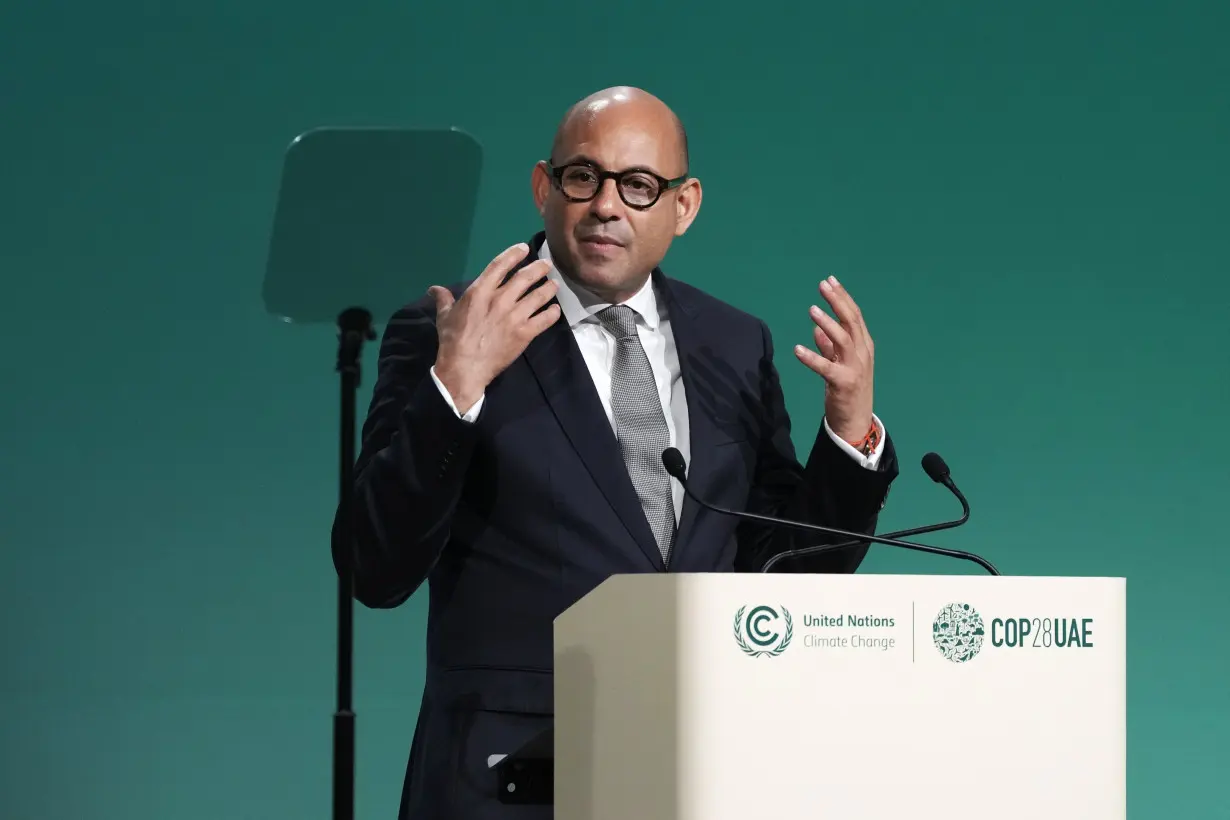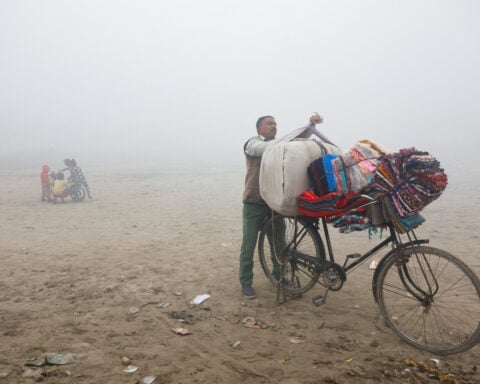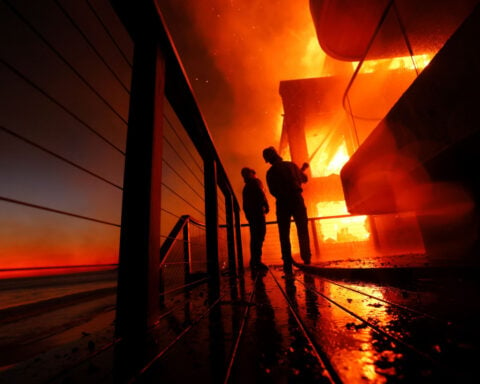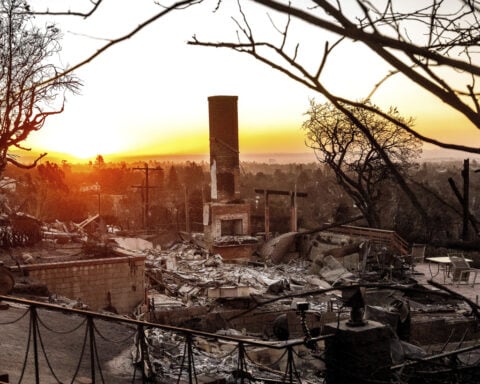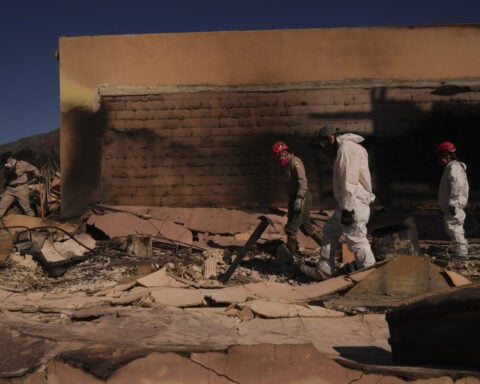OXFORD, England (AP) — Humanity has only two years left “to save the world” by making dramatic changes in the way it spews heat-trapping emissions and it has even less time to act to get the finances behind such a massive shift, the head of the United Nations climate agency said.
With governments of the world facing a 2025 deadline for new and stronger plans to curb carbon pollution, nearly half of the world's populations voting in elections this year, and crucial global finance meetings later this month in Washington, United Nations executive climate secretary Simon Stiell said Wednesday he knows his warning may sound melodramatic. But he said action over the next two years is “essential.”
“We still have a chance to make greenhouse gas emissions tumble, with a new generation of national climate plans. But we need these stronger plans, now,” Stiell said in a speech at the Chatham House think tank in London. He suggested that climate action is not just for powerful people to address — in a not-so-veiled reference to the electoral calendar this year.
“Who exactly has two years to save the world? The answer is every person on this planet,” Stiell said. “More and more people want climate action right across societies and political spectrums, in large part because they are feeling the impacts of the climate crisis in their everyday lives and their household budgets.”
Crop-destroying droughts have increased the need for bolder action to curb emissions and help farmers adapt which could boost food security and lessen hunger, he said. “Cutting fossil fuel pollution will mean better health and huge savings for governments and households alike,” Stiell said.
Not everyone is convinced such warnings will be helpful.
"‘Two years to save the world’ is meaningless rhetoric — at best, it’s likely to be ignored, at worst, it will be counterproductive,” said Princeton University climate scientist Michael Oppenheimer, who is also a professor of international affairs.
Levels of carbon dioxide and methane in the air last year hit all-time highs, according to United States government calculations, while scientists calculate that the world's carbon dioxide emissions jumped 1.1%. Last year was the hottest year on record by far, global temperature monitoring groups concluded.
If emissions of carbon dioxide and methane from burning of coal, oil and natural gas continue to rise or don't start a sharp decline, Stiell said it “will further entrench the gross inequalities between the world’s richest and poorest countries and communities" that are being worsened by climate change.
And behind it all is money.
Stiell's speech comes just ahead of meetings of The World Bank and other big multinational development institutions, where poorer nations, led by Barbados Prime Minister Mia Mottley and Kenyan President William Ruto, are pushing for major reforms in the systems that loan money to poor nations, especially those hit by climate-related disasters.
In conjunction with that push, Stiell called for “a quantum leap this year in climate finance.” He called for debt relief for the countries that need it the most, saying they are spending $400 billion on debt financing instead of preparing for and preventing future climate change.
He called for more financial aid, not just loans, and more money from different groups like banks, the International Maritime Organization, and the G20, the world's 20 most powerful economies. Those countries are responsible for 80% of the world's heat-trapping emissions, he said.
“G20 leadership must be at the core of the solution, as it was during the great financial crisis,” Stiell said.
"Every day, finance ministers, CEOs, investors, and development bankers direct trillions of dollars. It’s time to shift those dollars from the energy and infrastructure of the past, towards that of a cleaner, more resilient future," Stiell said. “And to ensure that the poorest and most vulnerable countries benefit.”
Officials said the climate finance problem needs to be fixed by the end of the year with November's climate negotiations in Baku, Azerbaijan, a crucial point.
Stiell is “absolutely right” that timing and finance are the heart of the matter, said longtime climate analyst Alden Meyer of European think tank E3G. The carbon action plans submitted by next year will “determine whether we can get on the trajectory of sharp emissions reductions needed to avoid much worse climate impacts than those we are already suffering today,” he said.
With so many elections and places where democracies on the brink, “climate finance related to carbon policy is on the line,” said Nancy Lindborg, president of the David and Lucille Packard Foundation, at the Skoll World Forum, an ideas conference in Oxford, England.
Climate Analytics CEO Bill Hare said Stiell was “listening to the science” — namely that global emissions must be halved by the end of the decade to meet the Paris climate accord's ambition of capping global temperature increases to 1.5 degrees Celsius (2.7 Fahrenheit).
“Governments are nowhere near that, and disastrously many are still supporting new fossil fuel development,” Hare said. “We need to see a massive strengthening of action now - faster ramping up of renewables, electric vehicles and batteries - if we’re to get serious reductions by 2030. The longer we wait, the more it will cost.”
___
Keaten contributed from Geneva.
___
Read more of AP’s climate coverage at http://www.apnews.com/climate-and-environment
___
Follow Seth Borenstein on X at @borenbears and Jamey Keaten at @jameykeaten.
___
The Associated Press’ climate and environmental coverage receives financial support from multiple private foundations. AP is solely responsible for all content. Find AP’s standards for working with philanthropies, a list of supporters and funded coverage areas at AP.org.

 Germany's economy shrank for the second consecutive year in 2024
Germany's economy shrank for the second consecutive year in 2024
 Italy, Albania, UAE sign deal for energy subsea interconnection
Italy, Albania, UAE sign deal for energy subsea interconnection
 European shares advance as bond yields ease; soft inflation powers UK stocks
European shares advance as bond yields ease; soft inflation powers UK stocks
 Bayern Munich signs US youngster Bajung Darboe from LAFC
Bayern Munich signs US youngster Bajung Darboe from LAFC
 Novak Djokovic breaks a tie with Roger Federer for the most Grand Slam matches in tennis history
Novak Djokovic breaks a tie with Roger Federer for the most Grand Slam matches in tennis history
 China's RedNote: what you need to know about the app TikTok users are flocking to
China's RedNote: what you need to know about the app TikTok users are flocking to
